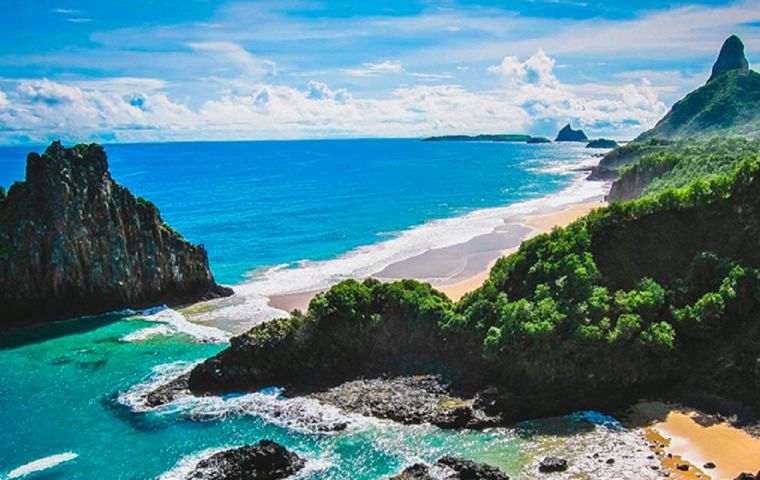MercoPress. South Atlantic News Agency
Ecuador extends Galapagos reserve forming a string of protected areas along the Pacific to Central America
 The new Ecuadorean reserve named “Brotherhood” extends the Galapagos islands protected area by another 60,000 square kilometers
The new Ecuadorean reserve named “Brotherhood” extends the Galapagos islands protected area by another 60,000 square kilometers Ecuador has created the marine reserve north of the Galapagos Islands in the Pacific helping to form a ring of protected areas, along the South American north Pacific rim that will include Colombia's Malpeso island, Panama's Coiba islands and Costa Rica Cocos islands.
The new Ecuadorean reserve named “Brotherhood” extends the Galapagos islands protected area by another 60,000 square kilometers adding to the already 133,000 square kilometers of the Galapagos Marine Reserve.
During the official inauguration ceremony at the islands, Ecuadorean president Guillermo Lasso said that “there are places that shape human history, and today we have the honor of being in one of those places”. He added “these islands teach us something about ourselves, what if instead of considering ourselves as masters of the Earth and the oceans, we become protectors?”
Lasso also pointed out that the seas are great regulators of global climate, and “taking care of the oceans is not naive idealism, but a vital necessity”. President Lasso first announced the expansion of the Galapagos reserve last November during the Glasgow climate summit COP26. The project was in exchange for a reduction of Ecuador's international foreign debt.
The expansion of the Galapagos marine reserve should also help to combat international illegal, unregulated, unreported fishing mainly by Asian fleets that have been caught depleting the area, while Ecuador has limited political and naval resources to impede such practices.
Colombian president Ivan Duque also attending the ceremony said that the new ring of reserves will guarantee the survival of 40% of world's marine species.
Matt Rand from The Pew Charitable Trusts, said: “Safeguarding the pathway between the linked biodiversity hot spots of the Galapagos and Costa Rica's Cocos Island helps to preserve this spectacular array of marine life”
“Ecuador's new protections recognize the critical importance of connectivity in effectively protecting highly migratory species such as sea turtles, sharks and whales,” Rand said.
In 1978, the Galapagos archipelago was declared a UNESCO World Natural Heritage, a site known for its unique flora and fauna, with such rare species as the marine iguanas and century old chelonians.
Galapagos was also a favorite research place for the British scientist Charles Darwin who in 1835 spent time in the islands which helped to inspire him and later write the monumental theory of the evolution of species.




Top Comments
Disclaimer & comment rules-

-

Read all commentsThat's nice and necessary, but it does not undo the damage done when the islands were designated a province in 1973, allowing unfettered access and settlement far in excess of the carrying capacity
Jan 17th, 2022 - 06:00 pm 0Do any of the countries have the ability to enforce this??? even if they have the will.
Jan 17th, 2022 - 11:11 pm 0Commenting for this story is now closed.
If you have a Facebook account, become a fan and comment on our Facebook Page!